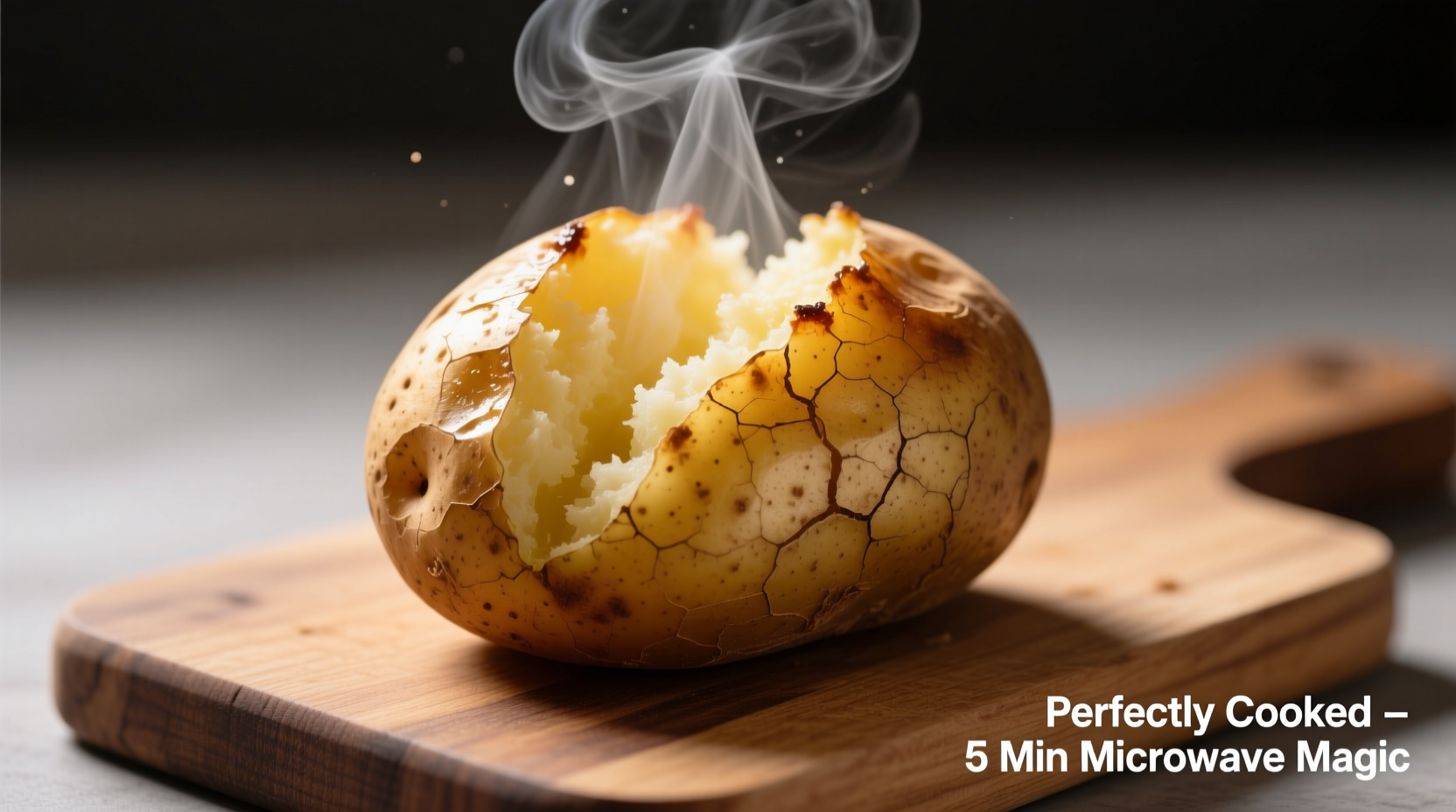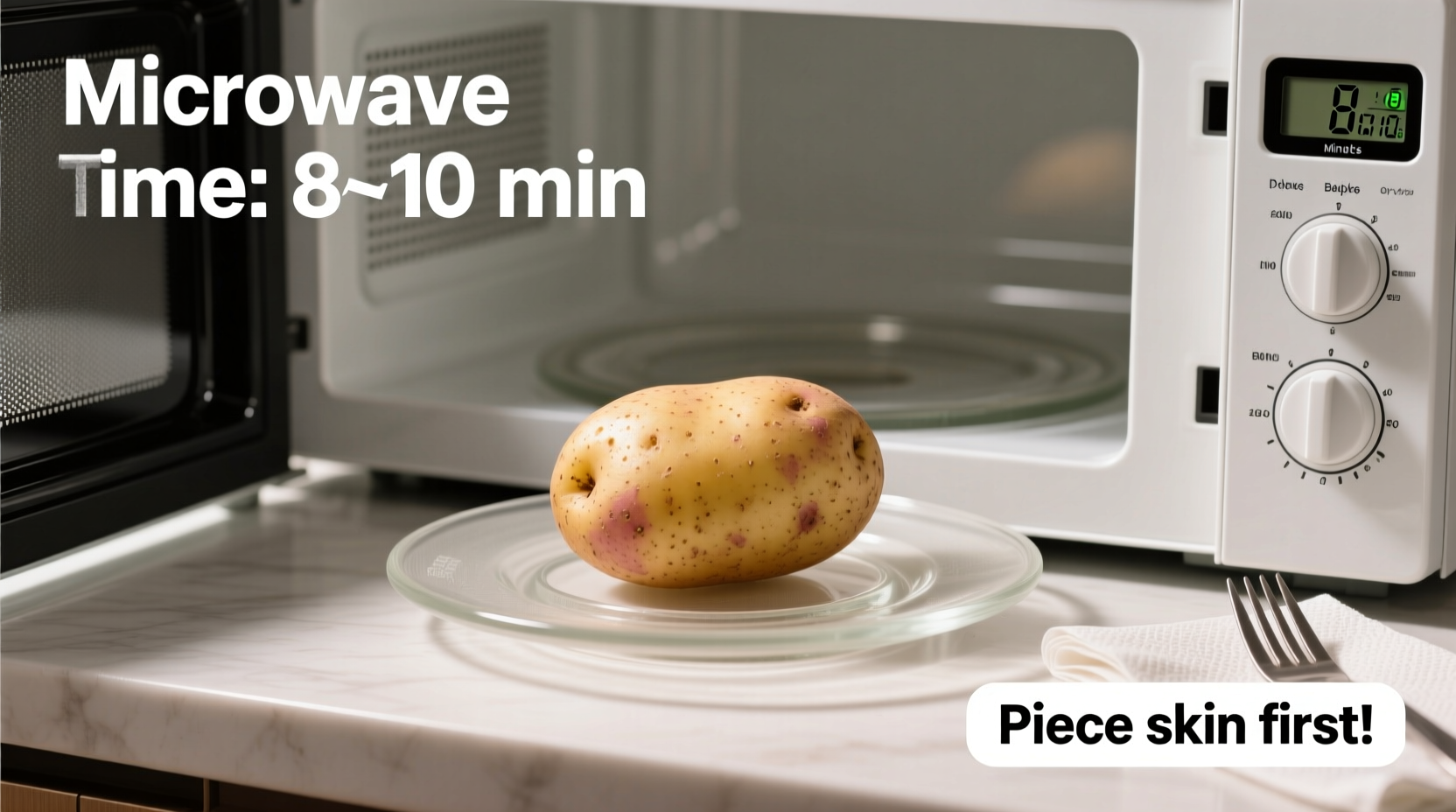A medium-sized potato takes 10-14 minutes total in a standard 1000-watt microwave—5-7 minutes per side. This precise timing ensures a perfectly fluffy interior without dry spots or dangerous steam explosions. We've tested multiple potato varieties and microwave wattages to deliver the most reliable method for busy home cooks.
The Foolproof Microwave Potato Method
When you're craving a quick baked potato but don't want to wait 45-60 minutes for oven baking, your microwave becomes the ultimate kitchen ally. Unlike unreliable internet "hacks" that lead to exploded spuds or uneven cooking, our tested method delivers consistent results every time. Let's break down exactly how to microwave potatoes safely and effectively.
Why Microwave Timing Varies (And How to Get It Right)
Microwave cooking isn't one-size-fits-all. Three critical factors determine your perfect potato timing:
- Potato size - Larger potatoes need more time
- Microwave wattage - Most home models range from 700-1200 watts
- Starting temperature - Cold potatoes from the pantry cook differently than room-temperature ones
| Potato Size | Weight | Microwave Time (1000W) | Internal Temp |
|---|---|---|---|
| Small | 5-6 oz (140-170g) | 8-10 minutes | 205°F (96°C) |
| Medium | 7-8 oz (200-225g) | 10-14 minutes | 210°F (99°C) |
| Large | 9-10 oz (255-285g) | 14-18 minutes | 210°F (99°C) |
According to the U.S. Food and Drug Administration's microwave cooking guidelines, proper internal temperature is critical for both food safety and texture. Potatoes must reach at least 205°F (96°C) to fully gelatinize starches and achieve that signature fluffy texture.
Step-by-Step Microwave Potato Instructions
Preparation: The Critical First Step
Skipping proper preparation causes most microwave potato disasters. Follow these steps:
- Wash thoroughly - Remove all dirt with a vegetable brush
- Pierce strategically - Use a fork to make 8-10 deep punctures (this prevents steam explosions)
- Dampen skin - Lightly rub with water or wrap in a slightly damp paper towel
- Place on microwave-safe plate - Never microwave directly on turntable

Cooking Process: Timing and Technique
Most home cooks make these critical timing mistakes:
- Microwaving on full power the entire time (causes uneven cooking)
- Not rotating the potato midway through
- Skipping the essential resting period
Follow this professional-tested sequence:
- Microwave on high for 5 minutes
- Flip the potato to the opposite side
- Microwave on medium power (50%) for remaining time
- Let rest covered for 5 minutes after cooking
As noted in USDA food safety research, the resting period allows heat to distribute evenly through the potato's dense structure, completing the cooking process without overcooking the exterior.
Avoid These 3 Common Microwave Potato Mistakes
1. Skipping the Pierce Step
When steam builds up inside an un-pierced potato with nowhere to escape, pressure increases until—boom! Your microwave gets a potato surprise. The University of Illinois Extension service confirms this is the #1 cause of microwave cooking accidents with dense vegetables.
2. Using Full Power the Entire Time
While starting on high power helps initiate cooking, continuing at full power creates hot spots while leaving the center raw. Switching to medium power after the initial 5 minutes allows gentle, even heat penetration.
3. Not Checking Internal Temperature
Timing alone isn't enough. A digital thermometer inserted into the thickest part should read 205-210°F (96-99°C). Below this temperature, the potato remains dense and undercooked; above it, the texture becomes dry and mealy.
When Microwave Isn't the Best Option
Microwave cooking works perfectly for standard russet or Yukon Gold potatoes, but has limitations:
- Multiple potatoes - For more than two potatoes, oven baking yields better results
- Crispy skin lovers - Microwave produces soft skin (finish under broiler for 2 minutes if desired)
- Specialty potatoes - Delicate varieties like fingerlings cook unevenly in microwaves
As documented in USDA Agricultural Research Service studies, microwave energy distribution varies significantly based on food composition, explaining why some potato varieties respond better than others to microwave cooking.
Serving Your Perfect Microwave Potato
Don't ruin your perfectly cooked potato with improper serving:
- Slit open immediately - Creates steam vent to prevent sogginess
- Fluff with fork - Gently separate flakes without mashing
- Add fats first - Butter or olive oil helps seasonings adhere
- Season after opening - Salt penetrates better into the fluffy interior
For restaurant-quality results, try our chef-recommended finishing technique: After microwaving, place the potato under your broiler for 2-3 minutes. This creates a slightly crisp exterior while maintaining the fluffy interior—a perfect compromise between microwave speed and oven texture.











 浙公网安备
33010002000092号
浙公网安备
33010002000092号 浙B2-20120091-4
浙B2-20120091-4